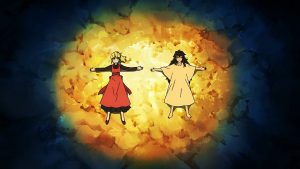 As we near the halfway point with Tower of God, news came via Twitter this week that the animation on the series is completed. While that’s certainly welcome news (this show has been one of the great unknowns of the season, postponement-wise) it’s worth remembering that the animation being finished doesn’t mean that the episodes themselves are. There’s the matter of voice recording, and compositing, editing – any of which could potentially lead to a delay. Still, this is a bit of hopeful news in an anime season starved for it.
As we near the halfway point with Tower of God, news came via Twitter this week that the animation on the series is completed. While that’s certainly welcome news (this show has been one of the great unknowns of the season, postponement-wise) it’s worth remembering that the animation being finished doesn’t mean that the episodes themselves are. There’s the matter of voice recording, and compositing, editing – any of which could potentially lead to a delay. Still, this is a bit of hopeful news in an anime season starved for it.
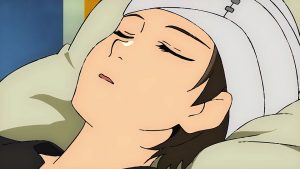 As for the show itself, after a couple of action-driven episodes this was very much a quiet week in Lake Woebegon. Given the shambles of the testing group in general, a break of several days had been declared. And even once that was over, rather than resume their test the group was sent into training instead. And at last the crucial concept of “positions” is introduced. These are the roles individual members will take in future team battles. Lero-ro doesn’t make it clear whether these assignments are based strictly on the individual’s natural proclivities with
As for the show itself, after a couple of action-driven episodes this was very much a quiet week in Lake Woebegon. Given the shambles of the testing group in general, a break of several days had been declared. And even once that was over, rather than resume their test the group was sent into training instead. And at last the crucial concept of “positions” is introduced. These are the roles individual members will take in future team battles. Lero-ro doesn’t make it clear whether these assignments are based strictly on the individual’s natural proclivities with Nen Shinsu, or something else, but they aren’t offered as a matter of choice.
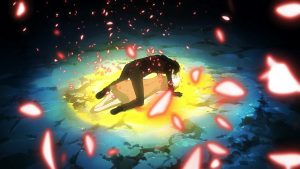 For Bam, the choice of Wave Controller (the rarest of all position assignments) is a fortuitous (though perhaps not coincidental) one, given that the instructor is two days late and it takes him an extra two days to awaken after his injuries. During this time Rachel pays a visit and asks Khun to tell Bam that she’s not Rachel at all. Khun is quite skeptical of this and of Rachel generally, and her answer – that she and Bam would only be weaknesses for each other in climbing the tower – doesn’t seem to convince him. But he does pass the lie along to Bam when he wakes, who for his part seems quite aware of the deception.
For Bam, the choice of Wave Controller (the rarest of all position assignments) is a fortuitous (though perhaps not coincidental) one, given that the instructor is two days late and it takes him an extra two days to awaken after his injuries. During this time Rachel pays a visit and asks Khun to tell Bam that she’s not Rachel at all. Khun is quite skeptical of this and of Rachel generally, and her answer – that she and Bam would only be weaknesses for each other in climbing the tower – doesn’t seem to convince him. But he does pass the lie along to Bam when he wakes, who for his part seems quite aware of the deception.
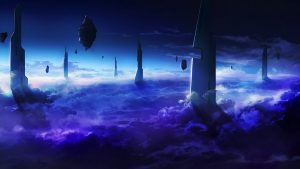 Another new concept – contracts. As Bam learns, one must be made with the guardian of that floor of the tower in order to be able to manipulate Shinsu. This proves a rather exhausting encounter for him, but Bam does manage. He’s been befriended by the kindly Hoh (Shioya Fumiyoshi), a fellow wave controller who seems concerned for Bam’s ability to keep up, but the youngster soon begins to surpass him in the training. Meanwhile the others are engaged in their own training sessions – Rak as a Spear Bearer, Khun as a Light Bearer. And Shibisu and Hatz are both Scouts, whose training including gathering ten friends (something Hatz especially finds rather difficult).
Another new concept – contracts. As Bam learns, one must be made with the guardian of that floor of the tower in order to be able to manipulate Shinsu. This proves a rather exhausting encounter for him, but Bam does manage. He’s been befriended by the kindly Hoh (Shioya Fumiyoshi), a fellow wave controller who seems concerned for Bam’s ability to keep up, but the youngster soon begins to surpass him in the training. Meanwhile the others are engaged in their own training sessions – Rak as a Spear Bearer, Khun as a Light Bearer. And Shibisu and Hatz are both Scouts, whose training including gathering ten friends (something Hatz especially finds rather difficult).
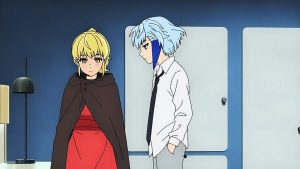 Ranking among the Fishermen are Anak and the “imposter” girl, whose name we finally hear uttered – Endorsi. These two only have eyes for each other – their fellow aspirants are of little interest (or threat). The matter of these Jahad princesses (who Laure refers to as “troublesome women”, which Endorsi doesn’t refute) is obviously rather complicated – involving the ruler of the tower and the various noble families – but it’s clear Endorsi considers Anak an outsider. And soon it becomes clear why – Anak is the orphaned daughter of a slain princess, and Endorsi refers to her as her “niece”. Anak professes to be driven by revenge for what happened to her parents – and Endorsi is at the top of her list.
Ranking among the Fishermen are Anak and the “imposter” girl, whose name we finally hear uttered – Endorsi. These two only have eyes for each other – their fellow aspirants are of little interest (or threat). The matter of these Jahad princesses (who Laure refers to as “troublesome women”, which Endorsi doesn’t refute) is obviously rather complicated – involving the ruler of the tower and the various noble families – but it’s clear Endorsi considers Anak an outsider. And soon it becomes clear why – Anak is the orphaned daughter of a slain princess, and Endorsi refers to her as her “niece”. Anak professes to be driven by revenge for what happened to her parents – and Endorsi is at the top of her list.
 A bit of housekeeping may be in order here, as regards proper names in Kami no Tou. As with Kingdom, we have an additional layer of complexity on top of the usual matter of inconsistent Romanization (with Korean it’s even more inconsistent) – in this instance, all these people and places have Korean as well as Japanese readings of their names. Names are passed through Korean to Japanese to English, at each stage being tweaked to account for localized pronunciation. As such you may variously see Anak referred to as a princess of “Jahad”, “Zahad”, or even “Zahard”. For my part I’m going with the official anime translations (not just for the princesses but names like Shibisu as well), which seem as close as any (for example, Korean has no “Z” sound – thus “Jahad”).
A bit of housekeeping may be in order here, as regards proper names in Kami no Tou. As with Kingdom, we have an additional layer of complexity on top of the usual matter of inconsistent Romanization (with Korean it’s even more inconsistent) – in this instance, all these people and places have Korean as well as Japanese readings of their names. Names are passed through Korean to Japanese to English, at each stage being tweaked to account for localized pronunciation. As such you may variously see Anak referred to as a princess of “Jahad”, “Zahad”, or even “Zahard”. For my part I’m going with the official anime translations (not just for the princesses but names like Shibisu as well), which seem as close as any (for example, Korean has no “Z” sound – thus “Jahad”).


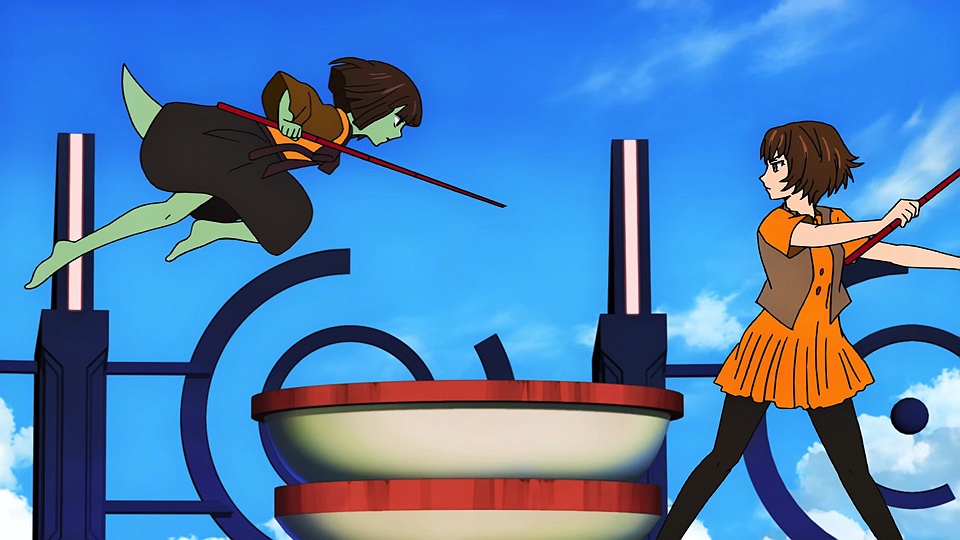



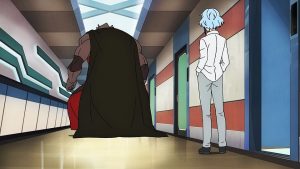


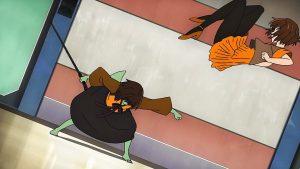
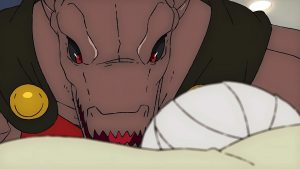
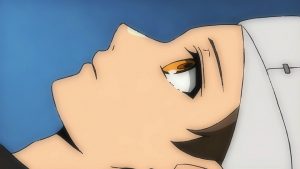

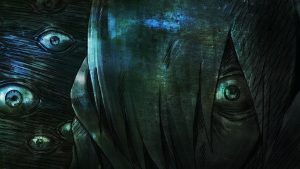
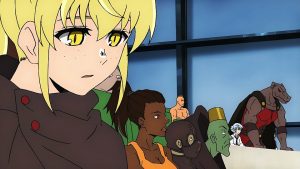
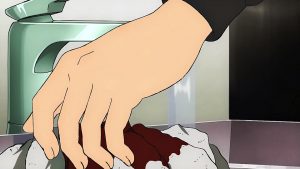
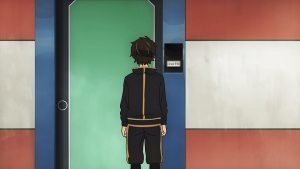
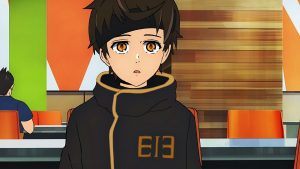


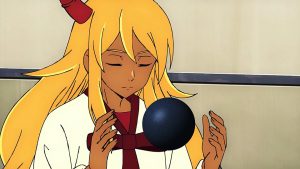
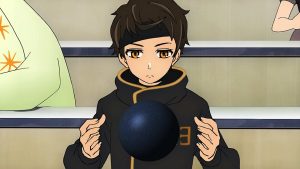
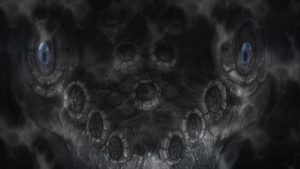
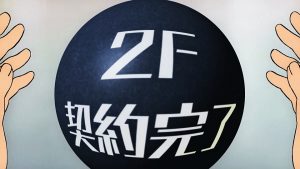
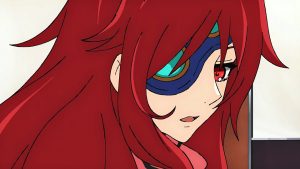
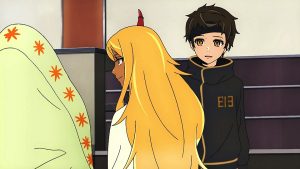
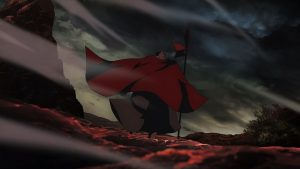
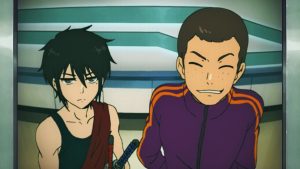
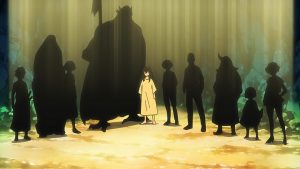


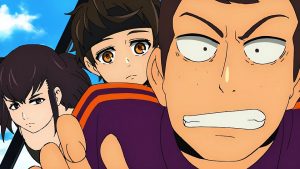

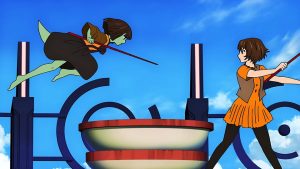
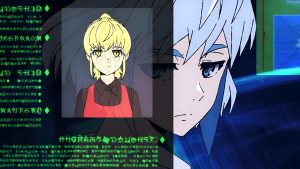
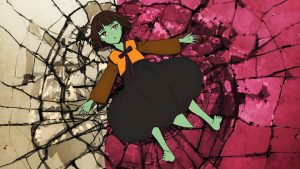
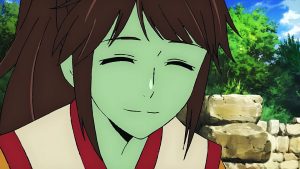




Elia Notari
May 7, 2020 at 5:46 pmThey did manage to modify something in this episode: the way they imply Baam is better than Hoh at Shinsoo is more subtle here (in the webcomic Lauroe is very forward in saying that Hoh is weak and after Baam creates a sphere of Shinsoo he says “that’s talent”); Hatz and Shibisu here wore their fighting clothes during the meeting with Khun and Baam (nothing bad, but it was a pleasant scene to see them in formal clothes, it adds a layer of realism).
They did skip a “cute” moment between Anaak and Shibisu when the latter asked her if she really thought he’s “good-looking” considering she wanted him to talk to Black March and she replied with “I don’t know much about men, so it appears I was wrong”. This is really nothing to brag about, but I wanted to mention it ’cause it showed they formed a bond at least.
Yukie
May 8, 2020 at 1:09 amI was definitely caught off guard by the translations in the first few episodes, like Bam as Yoru and Shinsoo as Kami no Mizu, when the rest of the casts’ names seem to match the subs. Mad confusing. With Kingdom I could at least understand the Chinese names, but Korean is definitely new territory.
Also, after you pointed it out, I can’t help but see nods to HxH everywhere in this anime…Fishermen?
Khun the Light Bearer–> Killua lol I’m drawing connections from all over the place.
Guardian Enzo
May 8, 2020 at 9:00 amOnce you start down that road it’s hard to stop. I do think the obvious HxH homages get less frequent the farther into the story you go, but the Nen-Shinsu parallels are unmissable.
Does that make Gator Leorio?
Yukie
May 9, 2020 at 4:47 pmI kind of see Shibisu as Leorio (Fujiwara Keiji’s version will always be my version of Leorio as well T.T), the “ordinary” man amongst extroadinary people, but Gator does seem like the Emitter type (weapon-wise and personality-wise lol).
Red
May 8, 2020 at 12:12 pmWell, in terms of worldbuilding, that episode makes things more interesting though I would like to know more like if you can gain or change into other positions since I got the impression that only the wave controller can direct Shinsu.
Speaking of parallels, is it just me or does Bam seems pretty bland as a protagonist and the side characters are more interesting. Maybe I just misunderstood his character and it will improve on the later parts. This was my impression when I was introduced to Gon back in the ’99 HxH and I couldn’t have been more wrong.
Guardian Enzo
May 8, 2020 at 12:39 pmCan’t answer the first question for obvious reasons. Stay tuned.
As to Bam, think about his background. His entire memory consists of living in a hole and dealing with only one other person for his entire life. He is the way he is because of that, and we’re still very early (like 10% at most, probably less) through the narrative the manhwa has already told. Bam is a blank slate at this point in the story but that definitely changes as he interacts with more people and understands his environment better. I actually don’t think he has much in common with Gon at all, apart from both of them being protagonists of a shounen action series surrounded by overpowered people with big personalities.
Red
May 8, 2020 at 3:36 pmMaybe that’s why I got that bland impression; blank slate it is. Thanks for the insight.
Yann
May 13, 2020 at 11:38 pmI totally enjoy watching this show even though I pretty much don’t understand anything… Is there a first season I missed somewhere? 😛
Milferd Jones
May 23, 2020 at 4:17 pmNan, Shinsu, Chakra, The Force, Ki, Yin and Yang and it goes on for names of concepts borrowed from Eastern Religions for what powers up people in fiction. TV Tropes “It been done before” totally applies here.
Ki the term used back in my 70 and 80’s Marvel comic book reading for the power martial artists used to keep up with the Superheroes with. Superhero story martial artists the nastiest you will find in fiction as they have to be to be a challenge in that Genre. The fact that Dr Strange is a several degree black belt on top of being a Master of the Magic Arts is truly something else. Dr Strange only beaten by the martial arts only superheroes in skill. Which is fine for Strange he only needs to hold you off for a short while before he sends opponent to another dimension or something. Ki definition aura, chi (or ch’i also qi), energy, vibe(s), vibration(s) used in Martial Arts from Merriam-Webster